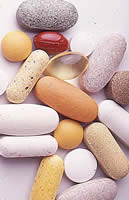How do companies who make vitamins supplements get the ingredients to put into the pills? Do they take small pieces from a vegetable & put it into pill form? If they are chemically made or man-made, how do they know what makes up a vitamin and put it into a pill?
 Most vitamins and other dietary supplements (minerals, essential fatty acids, amino acids, flavonoids, and botanicals) are made by a few raw materials manufacturers by a variety of processes, including extraction from foods, synthesis from other chemicals (including some from petrochemicals), fermentation from food sources, and breeding or engineering bacteria and yeasts to produce particular molecules.
Most vitamins and other dietary supplements (minerals, essential fatty acids, amino acids, flavonoids, and botanicals) are made by a few raw materials manufacturers by a variety of processes, including extraction from foods, synthesis from other chemicals (including some from petrochemicals), fermentation from food sources, and breeding or engineering bacteria and yeasts to produce particular molecules.
For example, vitamin C is commercially made by fermentation of corn sugar, converting glucose into ascorbate. Flavonoids (plant pigments) are almost always extracted from foods. Vitamin E can be synthesized or naturally extracted from food (usually soybeans), and in this case, the molecules are somewhat different from each other, and the natural is a more effective product.
Some B vitamins are synthesized, but it is impossible to get higher therapeutic doses from food extraction alone, and in this case the molecules are identical to the natural B vitamins. Some companies claim to simply tablet or encapsulate vitamins only as dehydrated foods, but the levels of vitamins in these products are not the therapeutic levels you see in most vitamin supplements — for example, it is not possible to put 500 mg of vitamin C in a pill just as dehydrated oranges — the concentration is too low in the food. The levels in these pills (dehydrated greens, for example), while better than nothing, are the levels people should get by eating a healthy diet. They are simply too low to be therapeutic.
As much as possible, I recommend that people get many nutrients from their diet. However, Americans (and now many other people around the world following the bad example in the U.S.), do not eat such a healthy diet. In addition, if they are sick or have certain genetic makeup they often need and benefit from supplements that are manufactured or derived from natural sources, but that are in doses much higher than in food alone.
Also, environmental toxin exposure creates certain hazards that can be overcome to some extent with dietary supplements, and botanical products can be helpful instead of drugs or to help lower the dose of drug needed for a disease. For example, diabetics need much higher doses of chromium than normal dietary levels (1000 mcg daily as opposed to 100 to 200 mcg). Heart patients benefit from higher doses of vitamins C and E, and coenzyme Q10. These require supplements for treatment, regardless of how they are manufactured. Saw palmetto helps prostate symptoms (standardized extract from the berries is most effective).
The companies know what makes up a vitamin, mineral, or herb to put in the pills by chemical testing, and the suppliers do testing before shipping to pill manufacturers. Responsible supplement companies do extensive testing after they receive the raw materials from the supplier.
